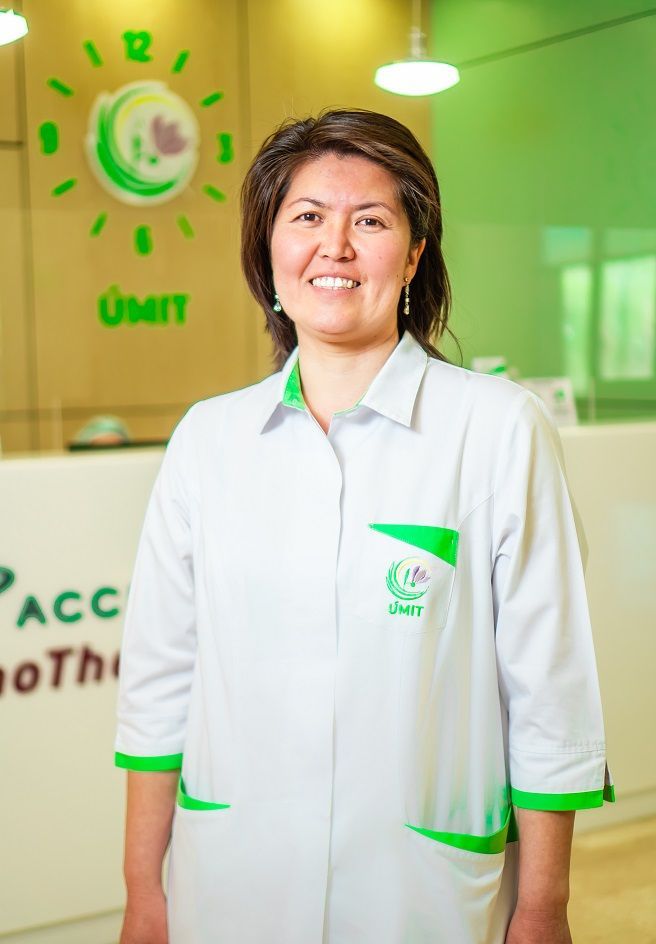
Breast cancer: do not be afraid of a mammologist!
Breast cancer: do not be afraid of a mammologist!
What you need to know about breast cancer: TopDoc.me, a free doctor search service, asked the most important questions to a highly qualified breast oncologist.
Medicine Doctor of the Hannover Medical Institute, oncologist-mammologist and chemotherapist Brimova Aigul Demeugaliyevna studied not only in Kazakhstan, but also in several western countries: Germany, Austria, USA. Aigul Demugaliyevna is a full member of the US NCBC mammological centers consortium, is well informed about new methods of diagnosis and treatment of benign and malignant diseases of mammary glands. The doctor works at the «UMIT» International oncological Center of TomoTherapy LLP in Astana.
It was Dr. Brimova that TopDoc.me turned to for up-to-date information on breast cancer (BC).
- What is breast cancer?
- Breast cancer (BC) is a malignant tumor that has different types, which differ both in their course and in their sensitivity to antitumor effects. Treatment is selected depending on the type of tumor.
On average, about 3500 women with breast cancer are diagnosed annually in Kazakhstan, of which about 1400, unfortunately, die - this is almost 45%. The five-year survival rate today is over 54%. The peak incidence occurs in women of 58-61 years old, nevertheless, cancer is detected in all age groups. And recently, there has been a tendency towards breast cancer rejuvenation, that is, cancer can occur in women under 40.
– What factors increase the risk of developing breast cancer?
- Firstly, exposure to radiation, chemicals, long-term use of hormonal drugs, contraceptives, hormone replacement therapy, in particular, during menopause. There are already many studies proving the connection between long-term use of hormone replacement therapy in menopause and an increased risk of developing breast cancer.
Secondly, lifestyle plays a role, such concept as an increase in the social level, leading to weight gain, to the development of diabetes mellitus, hypertension - can provoke a disease. In addition, hormonal changes during menopause, in case of the thyroid gland diseases, have a certain effect.
All these factors do not necessarily lead to cancer, but under certain circumstances and in the presence of stress, they provoke the appearance and development of malignant neoplasms.
With the development of technology, it became possible to determine the hereditary predisposition. In about 10% of cases, a hereditary factor plays a role, when there is a gene that is passed down from generation to generation. When we see in one family, for example, breast cancer in a grandmother and a mother, then the daughter will be at high risk. In laboratories, it is possible to have tests for the BRCA1 and BRCA2 genes - this is a genetic test for susceptibility to breast cancer. That is, a woman can find out if she has inherited this gene, in connection with which the likelihood of developing breast or ovaries cancer increases.
Breast cancer has several subtypes, by which we determine whether a tumor is provoked by the action of hormones or is associated with a mutation of certain genes. It is very important for the subsequent successful treatment to determine the status of the tumor, its biological subtype.
- How fast does a malignant breast tumor grow?
- It depends on the type of tumor, and the age of the woman also plays a role. In old age, the tumor develops slowly, it can grow for years, within 5-10 years. But if this is a young age, up to 50 years, the growth is faster, and up to 40 years old - very aggressively, it can grow within one year. Alsp a tumor can fastly grow in a woman taking hormone replacement therapy (HRT) in pre-menopause or menopause.
- What are the early symptoms of breast cancer?
- Unfortunately, there are no early symptoms of breast cancer. The tumor in the early stages is not detected, there is no pain, indurations, no discharge from the nipple, the woman is not worried about anything. Therefore, it is very important, starting at the age of 40, to undergo screenings, to do mammography, so that to have an opportunity to detect cancer at an early stage.
Early cancer can only be seen on mammography. At an early stage, breast cancer is represented by grouped microcalcifications - small dots, literally specks of dust, which can only be seen on an X-ray. Therefore, I strongly recommend women to undergo screening from the age of 40.
And in general, any girl, as soon as her period begins, should visit a mammologist once a year, because only a specialist can see and recognize any changes in the mammary gland. This will be enough to reveal any pathology and prevent it from developing.
- What other symptoms can appear in case of breast cancer?
If you have found that:
• one breast became visually different from the other;
• there is redness on the breast;
• the nipple has changed, became tight, swollen or retracted;
• bleeding from the nipple;
• a cavern appeared on the breast skin,
you have to immediately contact a mammologist.
- Where is breast cancer usually localized?
- Localization can be in any part of the mammary gland, and can even occur outside the mammary gland, for example, in the armpit, or above the chest, between the ribs. During screening, such a tumor located outside the mammary gland may not be visible, since it does not fall into the image area. And therefore, I repeat once again that once a year you need to go to a mammologist, as the doctor palpates both the mammary gland and all areas around and can determine the mass.
- Aigul Demeugaliyevna, now a large percentage of women suffer from mastopathy. Can mastopathy turn into cancer?
- Mastopathy is a hormonal dysfunction of the mammary glands, which is characterized by a change in the hormonal status of women. These changes can be combined with other hormonal changes, for example, there can be thyroid dysfunctions - hypothyroidism or hyperthyroidism, there can be cysts, fibroids, endometriosis, polyps - all this can cause changes in the mammary gland that require conservative treatment.
To say that mastopathy can cause cancer is wrong. Mastopathy itself does not cause cancer, but in a woman's body there may be cells that, under certain circumstances, mutate, begin to develop rapidly and degenerate into a malignant tumor.
Cancer cells exist in the body of any person, they appear every day, but our immune system recognizes them and destroys them. If there is a failure of the immune system, cancer cells begin to grow unhindered and are perceived by the body as their own.
- Where do breast cancer metastases go?
- Most often, breast cancer metastases appear in the lymph nodes, bones, liver, lungs, brain and ovaries - these are target organs. The lymph nodes are the first to react, so they should be checked first. Usually we make a puncture or during surgery a biopsy of the so-called "sentinel" node, which is closest to the tumor, which takes all the load, tries to fight cancer cells.
- How is BC treatment structured?
- At a multidisciplinary council, which includes surgeons, chemotherapists, radiation oncologists, histologists and other specialists, a diagnosis - breast cancer is made. We all discuss each case together, based on the data of the tumor subtype, taking into account the gene mutations found in the patient. Due to the molecular genetic analysis, we look what mutations there are and how they are provoked, how we can affect them. Geneticists give an opinion on mutations in genes and on their sensitivity to certain drugs. Applying these results, treatment is selected individually for a given person.
In the best way possible for the patient, a treatment plan is drawn up: either it is a surgical removal of the tumor and sentinel node, or chemotherapy is first performed. For example, we decided to undergo chemotherapy before surgery to reduce the size of the tumor and then undergo organ-preserving surgery.
Carrying out chemotherapy before the operation, we thereby prevent the development of metastases, that is, before the operation we are already killing cancer cells circulating in the blood. To date, there are studies proving that already at the zero stage of some types of cancer, cancer cells are released into the blood. Here we are talking about the prognosis of life for each individual patient. The effectiveness of the treatment is evaluated and then a surgical operation is performed to remove the tumor.
Breast cancer and any other cancer requires a multidisciplinary approach - since in malignant neoplasms, not only one organ is damaged, the entire body is involved.
- What side effects can be from radiation therapy for breast cancer?
- Skin burns are common. When the mammary gland is irradiated, the lungs, heart, esophagus can be involved in the process. As a result, fibrosis can develop in the lungs, in which shortness of breath appears on the slightest exertion. The heart suffers, arrhythmia may appear.
- What are the advantages of tomotherapy in the breast cancer treatment?
- Such type of radiation treatment, as tomotherapy, has important advantages: it is radiation with photons, and there is visualization of the tumor by computed tomography. The tomo machine creates a three-dimensional image of the tumor, its size, shape and localization are precisely determined. This allows, firstly, to deliver the required dose of radiation to the tumor with great accuracy. And secondly, due to spiral irradiation, the tumor is influenced from all projections, the entire tumor is equally exposed to radiation.
Only the place that needs to be irradiated is purposefully irradiated, the delivery of the beam goes only there without the involvement of neighboring organs and tissues. The tumor is irradiated more accurately and carefully, and, of course, this gives fewer complications.
Tomotherapy is safer and more gentle. The woman receives full-fledged effective treatment and, at the same time, her quality of life does not suffer. Tomotherapy treatment is outpatient, that is, the patient has the opportunity to maintain social activity.
The «UMIT» International oncological Center of TomoTherapy LLP provides an opportunity to apply for a tomotherapy treatment quota. Read more about how to get a quota in an interview with the director of the center Yerzhan Mukatayevich Shayakhmetov.
- How long do patients live after breast cancer treatment? Can they be completely cured?
- Zero and first stages of breast cancer are cured for 100%. If a woman has already have the third or fourth stage, then the results are much worse. According to statistics, the five-year survival rate (five years of life after diagnosis) is 54-55%.
Here we come back to the need for screening again. Unfortunately, poor attendance at screenings is our weak point. Our people start thinking about their health when it's getting late.
- But in other countries it happens the other way. For example, the famous case of the film actress Angelina Jolie - she preventively removed the mammary glands and ovaries. How justified is this?
- All women who have genetic mutations in the BRCA1 and BRCA2 genes have a high probability of developing breast cancer. By removing organs, Jolie reduced the likelihood of developing breast cancer, but we cannot say that she completely ruled out the likelihood of cancer. Single breast cells may remain in the chest, and with this mutation, there is a chance of developing cancer. Therefore, visiting a mammologist and undergoing mammography (available and free) is still mandatory for all women.
- Some women are afraid to undergo mammography, believing that it is unnecessary radiation.
- Such fear is not justified. Mammography is an X-ray of the breast, it is done in two projections. Almost everywhere now there are digital radiography machines, their radiation exposure is much lower than, for example, fluorography, and the resolution is very high. From the age of 40, every woman should undergo a mammography, since from this age the risk of breast cancer doubles.
For younger women under 40, mammography is not done, since the structure of their mammary gland is different, denser, and mammography is less informative. They undergo an ultrasound examination.
- Aigul Demugalievna, let's dispel a couple of myths that are often discussed among women. Is it true that the use of stick deodorants leads to breast cancer due to the accumulation of aluminum oxide in the lymph nodes? They also say that tight underwired bras can lead to cancer.
- No research has proven that the use of deodorants can lead to breast cancer. The same goes for tight underwired bras. There is no statistically reliable scientific data. Of course, it is necessary to wear linen in size and not tight, preferably cotton, this is more hygienic.
- Do breast implants affect the development of cancer?
- The implants themselves do not lead to cancer. But if the implant is damaged and its contents have leaked out, then in some cases this can cause the development of lymphoma - a malignant blood disease.
Women with implants must be examined by a mammologist at least once a year. The risk is that there may be microtrauma that the woman does not feel.
- Can frequent abortions affect the occurrence of problems in the mammary gland?
- Sure. Abortion causes changes in the mammary gland. When a woman becomes pregnant, the body begins to prepare for lactation, the production of certain hormones is in progress. Abortion is a gross interference with the hormonal sphere, which does not pass without leaving a trace for the breast.
- Does breast cancer happen in men?
- It happens. But very rarely and usually it is associated with the presence of the BRCA1 and / or BRCA2 gene. It is necessary to consider the whole family, usually the mother or sister has a cancer gene or breast cancer. Men with breast cancer undergo the same screening and treatment procedures as women.
- Some boys have breast swelling during puberty. Why is this happening?
- This is due to the lifestyle of a teenager, the food that he consumes, which may be high in estrogen. There is possibly also a connection with diseases of the thyroid gland, pathologies of the gallbladder, liver, which can lead to the production of female hormones. In such cases, we work together with endocrinologists and gastroenterologists.
Do not assume that the problem with the mammary glands is a problem only for women. Problems with the mammary glands are met in men too, and in boys.
Therefore, it is necessary to be on guard. If there is some kind of lump in a boy or a man - immediately go to the mammologist.
- Aigul Demugaliyevna, what would you like to say to women?
- Do not be afraid to go to a mammologist. Unfortunately, often, if a woman discovers a formation in her breasts, she is afraid to go to the doctor. But such behavior, the desire to hide from the problem - aggravate the course of the disease and worsen the prognosis.
At the slightest symptoms - something in your chest seemed unusual, strange, something hurts - contact a mammologist immediately. It is better to prevent any pathology in advance than to treat later in the later stages. Cancer at a late stage, with carcinolysis, with metastases, is much more difficult to treat, treatment is very difficult to endure, both physically, morally and socially.
When a woman has breast cancer in a family, the whole family suffers, everyone is involved in this process. Therefore, we work together with psychiatrists who know the specifics of cancer, they advise women in the treatment process. Many patients have depression, may have suicidal thoughts, and there may be family discord. Therefore, the treatment of breast cancer must be approached comprehensively, this is not only a problem of one person.
Doctor Aigul Demugaliyevna Brimova works at the «UMIT» International oncological Center of TomoTherapy LLP in Astana. You can make an appointment by leaving a request on the website or by calling + 7-707-22-55-009.







 public offer
public offer










